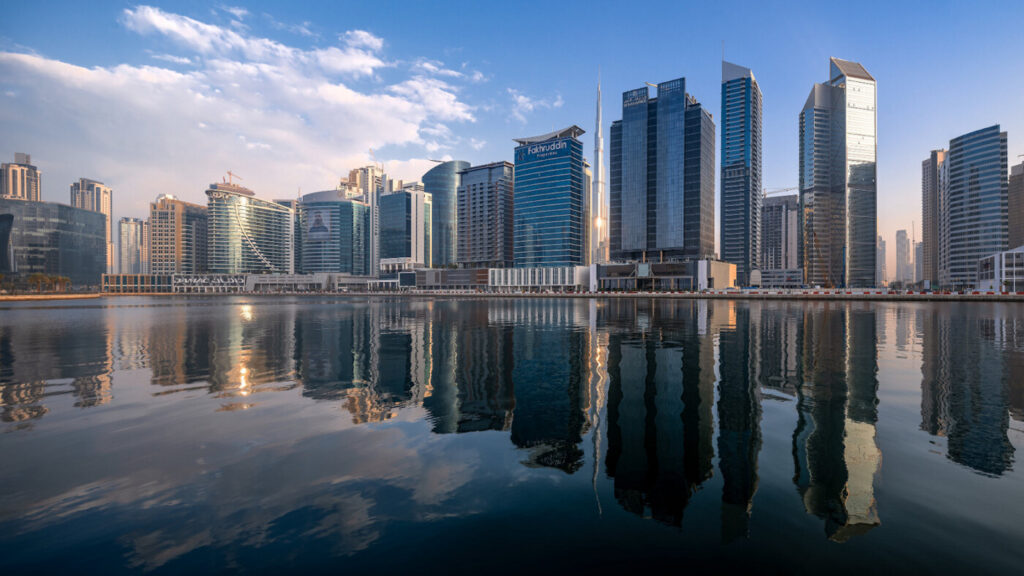
+30 % business growth. In the first quarter of last year, the number of business licenses in Dubai increased by 30%.
Favorable tax policies, active development of the region, a stable currency pegged to the dollar, and easy access to international markets make Dubai an attractive place for business.

Considering transferring your business or starting a new one abroad? In this article, we will briefly describe the entire process and the features you are likely to encounter.
READ: Business Licensing in the UAE: Successful and Legal Start
It is important to ensure that the chosen business name is not taken. This can be checked on the website of the UAE Ministry of Economic Development.
Obtaining permission to register a name from the Department of Economic Development (DED).
To register a company, you must provide a lease agreement or documents for the ownership of the premises. Some free zones allow you to open a business with a virtual office or use a coworking space instead of a permanent office, but this is not as common.
The list of documents may vary depending on the jurisdiction, but usually, a constituent agreement is required with information about the owners, type of activity, authorized capital, etc.
READ: Dubai Solar Park Overview: Significant Eco Project
Submitting documents to the registration authority, obtaining approval, and paying fees. Fees in the UAE change frequently, so please check the current amounts immediately before registering.
This stage is crucially important. All businesses in the UAE must obtain a license, categorized into four main types based on the nature of the activity:
It’s essential to note that only one license per type of activity is permitted, without the option of combining them. For instance, you cannot engage in shoe production and fashion consulting simultaneously, or sell dishes and smartphones together.
However, if your business necessitates a blend of different activities, solutions exist. For example, a “General Trading” license permits trading in a diverse array of goods. Additionally, specialized free economic zones allow for the combination of certain types and classes of licenses. For instance, “Dubai Internet City” enables IT companies to undertake production, consulting, and sales under a single license.
Hence, the choice of jurisdiction is pivotal. Much depends on where your company will be registered, underscoring the importance of careful consideration in advance. It’s also advisable to seek guidance from a specialist well-versed in the market.
Licenses are issued for a fee (costs vary depending on the license type and jurisdiction) annually, necessitating renewal thereafter.
Certain activities may require additional approval from other authorities; for instance, real estate companies require approval from the Real Estate Regulatory Agency (RERA), and healthcare companies require approval from the Dubai Health Authority.
Before commencing operations, companies must register with the Federal Tax Authority (FTA). Effective June 1, 2023, mandatory reporting, accounting, and corporate tax at a rate of 9% of profits were introduced in the United Arab Emirates.

Given the numerous nuances, it’s advisable to seek advice from an expert in the United Arab Emirates regarding taxes and optimization methods. Feel free to reach out to me for specialist contacts.
Despite the introduction of taxes, the tax conditions for businesses remain more favorable compared to other countries.
Company registration processes take longer than what you may be accustomed to, owing to the pace of government agencies in the Arab world.
While there are few banks in the United Arab Emirates, they are all highly reliable, being either semi-state-owned or owned by Sheikh families. Instances of license revocation or client deception by banks are unheard of. However, it’s the bank that decides whether to work with a particular business.
The quality and functionality of mobile applications and online services offered by mid-level banks vary.
Dubai is a multicultural city, offering no barriers for foreigners to conduct business. This inclusivity extends to “women’s” businesses, with women CEOs, owners, and top managers being entirely accepted. However, observing etiquette and respecting other cultures is crucial. For example, dressing professionally and avoiding restaurant appointments during the holy month of Ramadan is recommended.